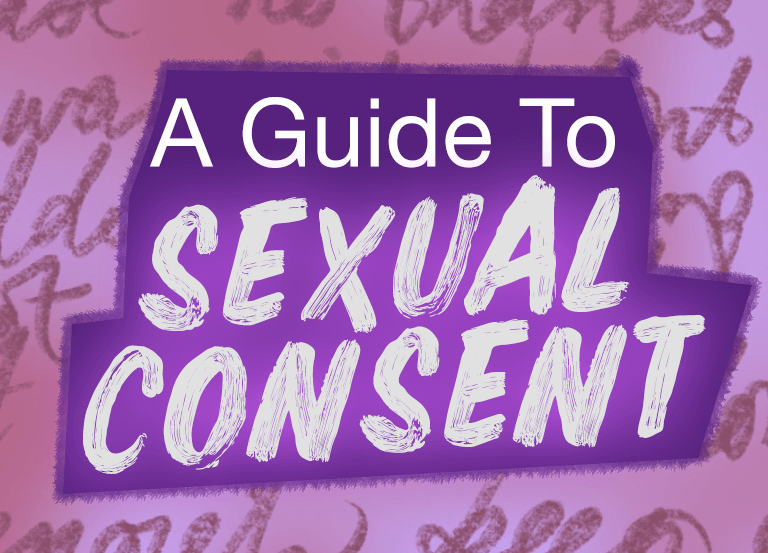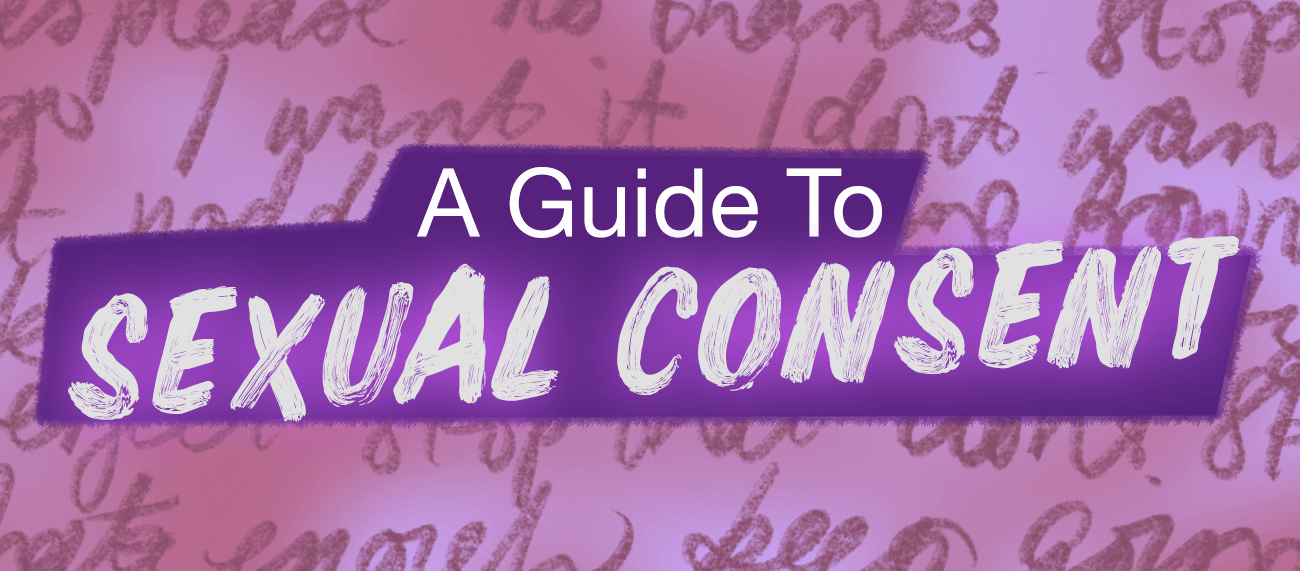A Guide to Sexual Consent
This article deals with themes of sexual assault and abuse.
Being able to understand consent and respect your own and others’ right to consent is vital in any sexual relationship. Without it, it would be difficult for you and your partner or partners to trust each other and respect each other’s boundaries fully.
It may seem simple – you might think it’s as easy as hearing a “yes” and proceeding, or a “no” and stopping – but what happens if someone exercises their right to change their mind? What happens if consent happens non-verbally? What if they say yes, but there’s deception or alcohol involved?
Sexual encounters can make you vulnerable to STIs, pregnancy, or even abuse. This is part of why it’s so important that everyone involved can consent, and is allowed to stop when they don’t.
We love that you’re here to learn about consent because everyone needs to know about it! Just remember that everyone is different and may express their consent differently to you or others you’ve been with. Make sure you keep open lines of communication with anyone you might have sexual contact with, and if you can have a clear conversation about what consent means to each of you before you do anything, then even better!
What is consent?
Giving sexual consent means agreeing to some form of sexual activity.
For consent to actually be consent, it needs to be freely given, fully informed, unpressured, and by someone above the age of consent (which is 16 in the UK). This means that if you have to lie to get consent, it isn’t consent. If you pressure someone by repeatedly asking, punish them for saying no or being reluctant, or blackmail them into sex, they aren’t really consenting. They must also not be too drunk to consent. If they’ve been sick, are having trouble standing or walking, or are behaving out of character, they are not sober enough to fully consent.
Asking for consent
You might feel a little nervous or uncomfortable about verbalising your desires, and that’s okay – but it doesn’t make asking for consent any less necessary. It is always important to make sure that your partner consents to any form of sexual contact before it happens, even if you’re in a relationship. Dating or being married to someone does not count as sexual consent.
Fortunately, there’s no one set way to ask for consent. You can ask direct questions, like “Do you want to have sex?” or “Are you comfortable with me kissing you?”, or you can even ask your partner what they would like to do next. If you’re worried about killing the mood, try having a conversation in advance about what consent looks like to them, or maybe even discuss having a safe word that means “No, you need to stop”.
You can also ask before you get started whether they’re open to having sex later, and try to be aware of the cues they’re giving. No matter how much or how little discussion there has been in advance, make sure that you’re always giving them space to change their mind and that they can feel comfortable saying “no”.
Verbal and non-verbal cues
Verbal cues can be things like “Yes, I’d like to have sex” or “Keep going, that feels good”. Non-verbal cues are things you or your partner can do without speaking, for instance, they might look happy, or unhappy, or maybe they’re moving closer to you or shifting away from you. They could be touching you, or trying to avoid letting you touch them.
It can be possible to misinterpret both verbal and non-verbal cues – especially the more subtle ones – so if you feel uncertain, you should slow down or stop. From there you can double-check and keep going if your partner is comfortable with it, or stop if you find that perhaps your uncertainty was really you picking up on their discomfort.
Sexual consent laws
It is considered rape to have sex with someone who is only consenting because they are drunk, or because they have been lied to. This can lead to prosecution. This is also the case when someone chooses to withdraw consent, or the terms of the encounter change, such as with “stealthing” – an act where a person removes the barrier contraceptive (a condom, or a dental dam, for instance) during sex and continues without mentioning that they have done so.
In the UK, a person who is aged 16 or older can consent to sex with another person who is also 16 or older. However, if someone older than 16 is having sex with someone who is under the age of 16 – and therefore cannot consent – it is a serious offence.
Previously there were different laws for some LGBT+ couples. Men could not legally consent to sex with one another until the age of 21 – up until 1994 when it was changed to 18, and then finally to 16 in 2001. As of 2001, the same laws apply to everyone.
Why is consent important?
Consent is how you know that everyone is comfortable with what is happening and that no one feels hurt or taken advantage of. As we said earlier, sex can put you in a vulnerable position. Everyone must be allowed to choose what is happening to their own body and what they would like to do with other people.
If you have experienced sexual assault, rape, or feel that your right to consent to sexual activity has been violated in any way, there is support available for you. You can reach out to a trusted friend or family member for support, and you can also find resources through organisations like the NHS, which offers guidance on where to get help after experiencing rape or sexual assault. Organisations like Rape Crisis England & Wales can also provide support and assistance in navigating your next steps. Whether or not you report what happened to the police is your choice, but it can be helpful to have support from others while you make that decision.
Want to read more about sex and relationships? Why not check out “A Relationship That Counts: Sex and Your Mental Health” or “Losing Your Virginity Later in Life: Your Body, Your Timeline”? You can also visit our Features page for all that and way more!
ellaOne® 30mg film-coated tablet contains ulipristal acetate and is indicated for emergency contraception within 120 hours (5 days) of unprotected sexual intercourse or contraceptive failure.
References:
https://www.cps.gov.uk/legal-guidance/rape-and-sexual-offences-chapter-6-consent
https://alcoholchange.org.uk/alcohol-facts/fact-sheets/alcohol-and-sex
https://www.ellaone.co.uk/magazine/features/what-is-stealthing/
https://www.stonewall.org.uk/our-work/campaigns/love-wins-age-consent-equalised-gay-and-bi-men




